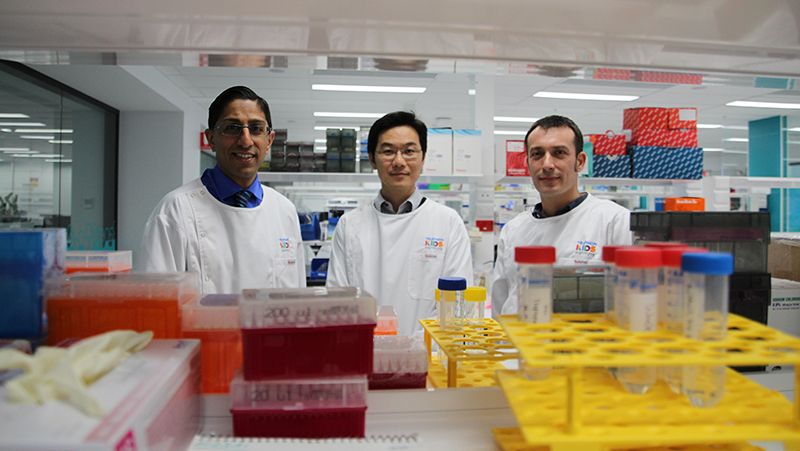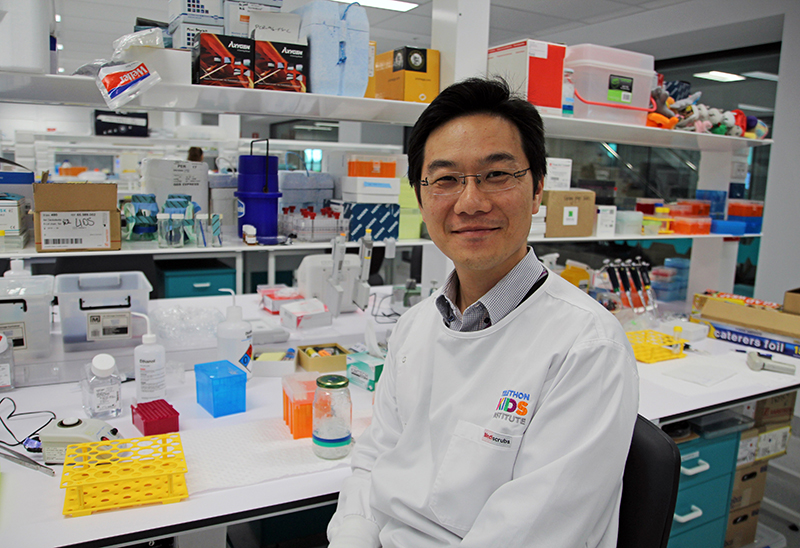Search

News & Events
Lightening the leukaemia load for kids with Down syndromeKids born with Down syndrome are at high risk of an array of health problems. One of the lesser-known complications is their increased risk of childhood leukaemia.

News & Events
Working to end childhood cancer: A father’s storyDr Laurence Cheung is doing everything he can to end the threat of childhood leukemia. His research has the potential to change countless lives, but he also has another important job – being a dad to three beautiful children.

News & Events
Funding partnership to uncover new brain cancer treatments for kidsThe Robert Connor Dawes Foundation has joined forces with the Ethan Davies Fellowship to co-fund a The Kids Research Institute Australia initiative aimed at uncovering new treatments for aggressive childhood brain tumours.

News & Events
The Kids researchers share in $1.75m ACRF grant for cancer researchThree The Kids researchers are collaborating on a cancer research project that has been awarded a $1.75mill grant by the Australian Cancer Research Fund.
Research
From signalling pathways to targeted therapies: unravelling glioblastoma’s secrets and harnessing two decades of progressGlioblastoma, a rare, and highly lethal form of brain cancer, poses significant challenges in terms of therapeutic resistance, and poor survival rates for both adult and paediatric patients alike. Despite advancements in brain cancer research driven by a technological revolution, translating our understanding of glioblastoma pathogenesis into improved clinical outcomes remains a critical unmet need.
Research
Intravascular Tumor Extension and Pulmonary Tumor Embolism in Children With Solid Malignancies: Is There a Role for Inferior Vena Cava Filters?Intravascular tumor extension is an uncommon complication of solid malignancies that, when present in the inferior vena cava (IVC), can result in fatal pulmonary tumor embolism. Currently, neoadjuvant chemotherapy and surgery are the mainstays of treatment; however, there are no consensus guidelines for management.
Research
Single-nucleus RNA sequencing of pre-malignant liver reveals disease-associated hepatocyte state with HCC prognostic potentialCurrent approaches to staging chronic liver diseases have limited utility for predicting liver cancer risk. Here, we employed single-nucleus RNA sequencing (snRNA-seq) to characterize the cellular microenvironment of healthy and pre-malignant livers using two distinct mouse models.
Research
Clinical phenotypes and prognostic features of embryonal tumours with multi-layered rosettes: a Rare Brain Tumor Registry studyEmbryonal tumours with multi-layered rosettes (ETMRs) are a newly recognised, rare paediatric brain tumour with alterations of the C19MC microRNA locus. Due to varied diagnostic practices and scarce clinical data, disease features and determinants of outcomes for these tumours are poorly defined. We did an integrated clinicopathological and molecular analysis of primary ETMRs to define clinical phenotypes, and to identify prognostic factors of survival and key treatment modalities for this orphan disease.
Research
Multi-omics analysis defines highly refractory RAS burdened immature subgroup of infant acute lymphoblastic leukemiaKMT2A-rearranged infant acute lymphoblastic leukemia (ALL) represents the most refractory type of childhood leukemia. To uncover the molecular heterogeneity of this disease, we perform RNA sequencing, methylation array analysis, whole exome and targeted deep sequencing on 84 infants with KMT2A-rearranged leukemia.
Research
Stepwise GATA1 and SMC3 mutations alter megakaryocyte differentiation in a Down syndrome leukemia modelAcute megakaryoblastic leukemia of Down syndrome (DS-AMKL) is a model of clonal evolution from a preleukemic transient myeloproliferative disorder requiring both a trisomy 21 (T21) and a GATA1s mutation to a leukemia driven by additional driver mutations.
